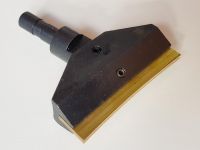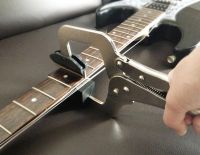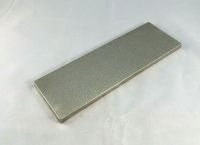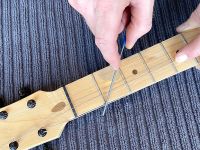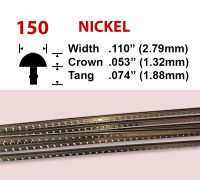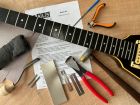GOLD #150 Fretwire - Wide/Highest Gauge - 1.8 metres
In stock
SKU
FW-011-150G
$73.00
- Buy 3 for $65.70 each and save 10%
- Gold-coloured copper alloy
- Extra hard alloy for superior durability
- Colour is through entire thickness
- Resists tarnishing
- 6 x 300mm (12") lengths, enough for 1 guitar
- Width - 2.79mm (0.110")
- Crown Height - 1.35mm (0.053")
- Tang Height - 1.88mm (0.074")
- Fits a standard width slot approximately 0.58mm (0.023")
- For electric guitar or bass
Gold fretwire is a relatively new type fretwire which has great potential in guitar making due to it's hardness, workability and aesthetic qualities.
It looks great, especially when used with gold hardware. Don't let the colour fool you, this is not ordinary brass!
Made from a special alloy of copper, zinc and several other elements, Gold fretwire has a handsome brass/gold colour but is harder wearing than either nickel-silver or brass and won't tarnish over time.
It is a great choice if you are looking for more long wearing frets, without the difficulty of installation and unusual tone associated with stainless steel frets.
For electric guitar or bass. Modern "jumbo" fretwire used on ESP, Jackson, Ibanez, Kramer and similar guitars.
See below for more info about choosing fretwire.
Related Products
We found other products you might like!
Fret File + Inserts
Starting at $37.90
Offset Diamond Fret Files
Starting at $169.90
Essential Refret Tool Kit
$485.00
Japanese Fret Dressing Kit
$219.00
Gold Fretwire is more durable than Nickel but easier to work with than Stainless.
The Gold fretwire is composed of C425 copper alloy, a blend of zinc and other metals. It has a pleasant gold colour that looks great especially when used with gold hardware.
The alloy is soft enough to work with using standard woodworking files and abrasives, but hard enough to resist the wear of guitar strings. It takes a bend well but will maintain its shape when being installed.
Gold frets have a pleasant tone and add a hint of brightness to a guitar, but not as much as Stainless Steel does.
Choosing Fretwire
Slot Width and Compatibility - The width of the slots in the fingerboards of guitars and other instruments is usually quite standard and all of our fretwires will fit the majority of guitar fingerboards. A slot width of 0.55-0.6mm (0.022-0.024”) is standard.
The tang (the part of the fret that goes in the slot) is always wider than the slot, especially where it has knobs on the sides. This extra width helps hold the fret firmly in place in the slot.
Fretting a New Guitar - If you are building a guitar you can use any size fretwire. You can look at the description of each fretwire type we stock for guidance as to which instruments it’s best suited to. In general you can’t go wrong with the Standard/Medium, Oversize Medium and Jumbo/Large sizes on most acoustic and electric guitars.
Refretting a Guitar - If you are replacing the frets in an existing guitar it’s conventional to choose a size of fretwire which closely matches the original fretwire. Unless the owner of the guitar specifically wants a different size of fretwire it’s best to use a gauge of wire that matches the dimensions if the fretwire used used when the guitar was made.
Accurate measurement of the width and height of the original frets is important and the best way to measure these is with our Luthiers Digital Caliper.
Size - Fretwire is available in a number of different sizes. Some guitarists prefer a particular size of frets while others don’t notice much difference.
If you are unsure of what size to buy the safest sizes are Medium, Oversize Medium and Jumbo.
Width - As a loose rule narrower gauge frets are preferred for rhythm guitar, while wider gauges are better suited to string bending and lead playing. Some players prefer narrower frets as they give a little more space between the frets.
Height - The height of the frets is a personal preference. Some players prefer the feel of low frets while others don't like them because their fingers are too close to the fingerboard.
Very Large Frets are becoming popular, especially on electric guitars and amongst metal guitarists. Super Jumbo fretwire is a little wider and taller than traditional jumbo frets and Double Jumbo is larger still.
If you are unsure of what size to buy the safest sizes are Medium, Oversize Medium and Jumbo.
The Gold fretwire is composed of C425 copper alloy, a blend of zinc and other metals. It has a pleasant gold colour that looks great especially when used with gold hardware.
The alloy is soft enough to work with using standard woodworking files and abrasives, but hard enough to resist the wear of guitar strings. It takes a bend well but will maintain its shape when being installed.
Gold frets have a pleasant tone and add a hint of brightness to a guitar, but not as much as Stainless Steel does.
Choosing Fretwire
Slot Width and Compatibility - The width of the slots in the fingerboards of guitars and other instruments is usually quite standard and all of our fretwires will fit the majority of guitar fingerboards. A slot width of 0.55-0.6mm (0.022-0.024”) is standard.
The tang (the part of the fret that goes in the slot) is always wider than the slot, especially where it has knobs on the sides. This extra width helps hold the fret firmly in place in the slot.
Fretting a New Guitar - If you are building a guitar you can use any size fretwire. You can look at the description of each fretwire type we stock for guidance as to which instruments it’s best suited to. In general you can’t go wrong with the Standard/Medium, Oversize Medium and Jumbo/Large sizes on most acoustic and electric guitars.
Refretting a Guitar - If you are replacing the frets in an existing guitar it’s conventional to choose a size of fretwire which closely matches the original fretwire. Unless the owner of the guitar specifically wants a different size of fretwire it’s best to use a gauge of wire that matches the dimensions if the fretwire used used when the guitar was made.
Accurate measurement of the width and height of the original frets is important and the best way to measure these is with our Luthiers Digital Caliper.
Size - Fretwire is available in a number of different sizes. Some guitarists prefer a particular size of frets while others don’t notice much difference.
If you are unsure of what size to buy the safest sizes are Medium, Oversize Medium and Jumbo.
Width - As a loose rule narrower gauge frets are preferred for rhythm guitar, while wider gauges are better suited to string bending and lead playing. Some players prefer narrower frets as they give a little more space between the frets.
Height - The height of the frets is a personal preference. Some players prefer the feel of low frets while others don't like them because their fingers are too close to the fingerboard.
Very Large Frets are becoming popular, especially on electric guitars and amongst metal guitarists. Super Jumbo fretwire is a little wider and taller than traditional jumbo frets and Double Jumbo is larger still.
If you are unsure of what size to buy the safest sizes are Medium, Oversize Medium and Jumbo.


